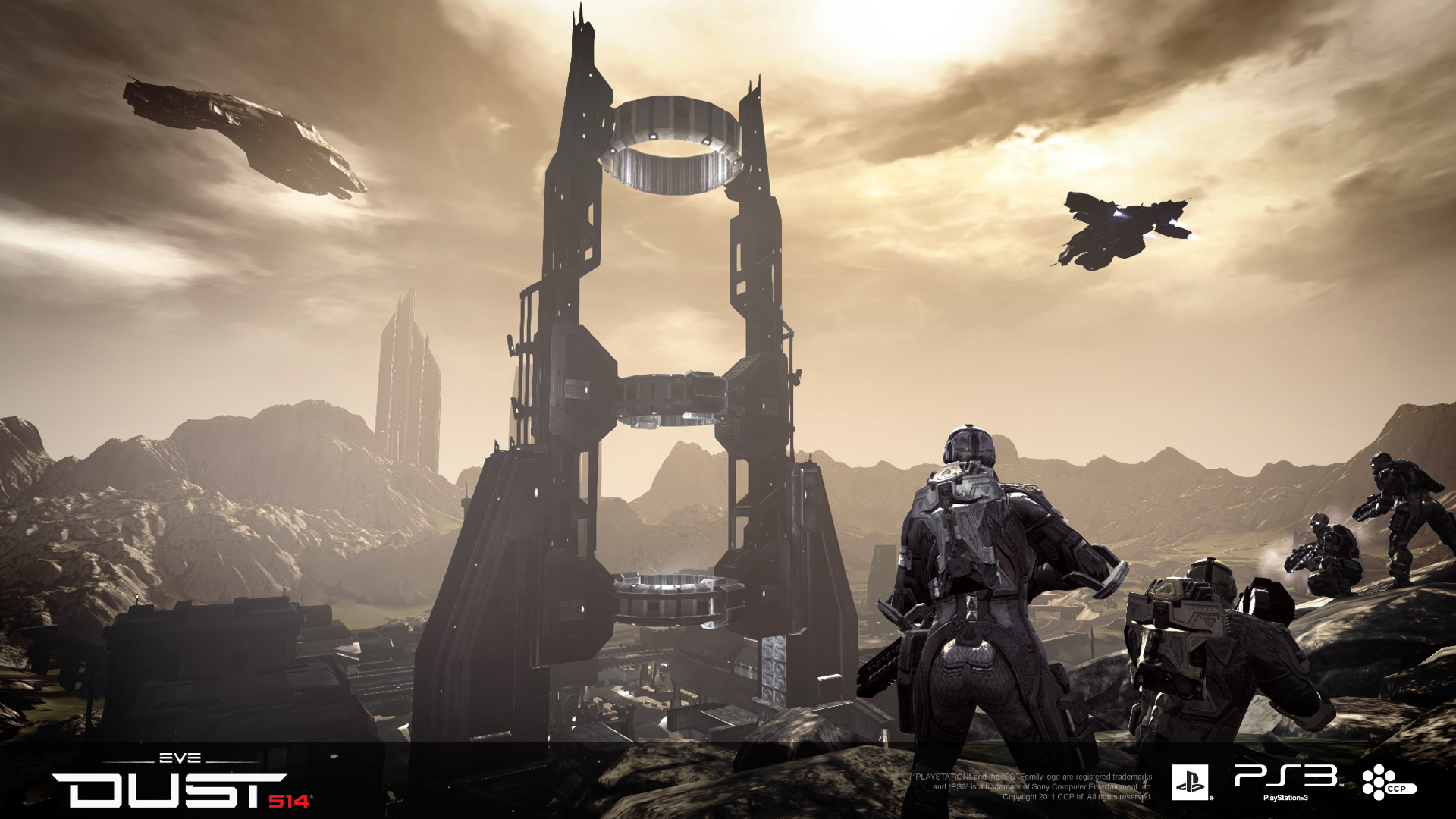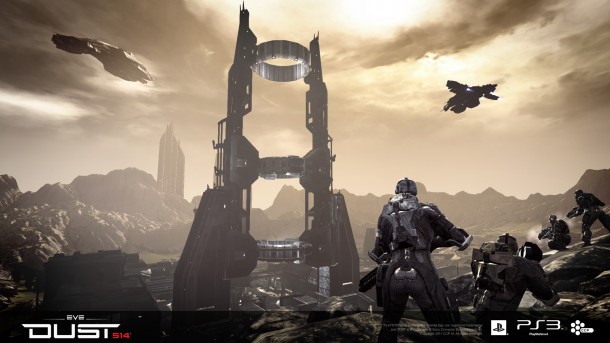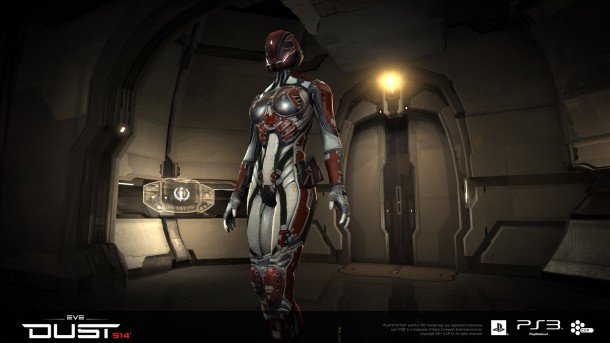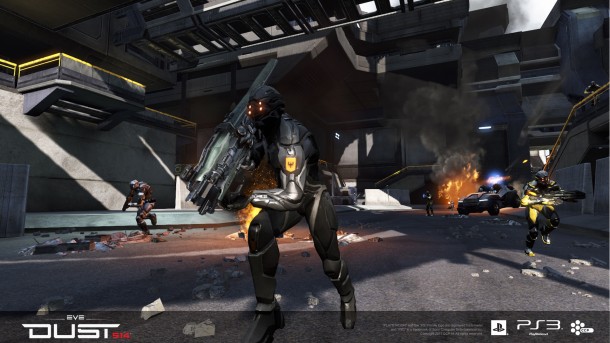Instead of doing a traditional review of Dust 514, we’ve decided to break up our impressions in this weekly review diary. Each entry will focus on different aspects, in order to better gauge the huge and evolving nature of the MMOFPS. If you haven’t already, check out Part One of our Dust 514 Review Diary.
Socializing and Communication:
[dropcap]T[/dropcap]he world of Dust 514 is not a kind one when it comes to lone wolves. While most competitive multiplayer games are best enjoyed with comrades-in-arms, Dust takes that particular concept to the furthest logical extreme.
In the shared universe of EVE Online, every player starts out as a private gun for hire. That means the initial scope of the game for any new player is rather limited. You can roll around looking to get rich for your own amusement, but that’s not what has kept players and casual observers so intrigued for the past decade. The true promise of EVE — the carrot at the end of that oh-so-complicated stick — is being able to impact the universe at large with your own treachery, heroism, and capitalist skullduggery. The promise of Dust, specifically, is to whittle down those complexities as much as possible, allowing more “casual gamers” to hitch along for the ride by doing something they can comprehend (shooting people in the face) instead of exploring the vastness of space.
Having that sort of impact isn’t really viable until a player becomes a cog in a greater machine, or, in this case, a “corporation.”
The corporations of Dust mimic the guild systems of modern MMOs, as they tie directly into EVE’s identical system. Dust players can join EVE-based corporations, and vice versa, while players on both fronts communicate in real time.
This is, perhaps, the most important feature of Dust 514. It’s what elevates it from something you play (a fairly inoffensive Battlefield clone) to a social arena, where you can hang out with friends and corporate companions.
Upon loading Dust for the very first time, having completed the bog-standard multiplayer game requirements of creating your character and selecting opening traits, you’ll find your character standing not on the field of battle, but inside his/her own personal quarters aboard a space station.
I was surprised to find myself spending most of my time in these quarters, rather than with boots on the ground, battling it out for face-shooting supremacy. From here, you can allocate skill points, scour the in-game marketplace, theorycraft better character fittings, and, perhaps most importantly, chat with your allies. At any point, an intuitive communication hub can be pulled across the screen by pressing the select button. Here you can chat with either an onscreen keyboard, or a microphone of your choosing. With communication being key to both squad-based combat and understanding your role in the universe, it’s great to see the whole affair working smoothly.
The chat overlay also has the (perhaps unexpected) side effect of making Dust feel more like a social hub, of which combat is only one of many vital components. Bringing the right equipment and team into the right fight can make all the difference, particularly in the more organized Planetary Conquest matches, which see handpicked teams from opposing corporations duking it out for control of various planets. That means, between new players asking for advice, and seasoned vets looking to argue the idiosyncrasies of the game to squeeze the best performance out of squad formations, there’s going to be an awful lot of talking involved. With that, I might point out that I probably spent nearly as much time just discussing the game, and tweaking my character based on the advice of my peers as I did in actual combat. There was also at least one discussion about the acting in Django Unchained, driving home the fact that this is a game populated with MMO fans.
As you might imagine, all of the social aspects fall well within “your mileage may vary” territory. CCP was kind enough to set me up with an organized player corporation. In my time with the game, I’ve personally seen at least a few dozen such well-oiled machines, with no one group seeming to be the be-all-end-all. On top of that, there’s never a shortage of players spamming the system’s public channel looking for recruits. It may take some searching to find a properly polished group that meets whatever standards you may have, but that’s just the reality of online games, massively multiplayer or otherwise. At the very least, the process of finding one here isn’t hampered by a clumsy interface.
The social aspects of Dust gel together better than anything else at this point in the game’s life cycle. Grinding out in-game currency and skill points on your own with Dust’s limited match types and steep learning curve is a chore. However, the meta-game provided by theorycrafting with players who have been around since the Dark Ages of Beta (and therefore actually know what they’re doing) is exceedingly rewarding, and easy to fall into thanks to the ever-present, one-touch chat interface.
If Dust is going to stand the test of time even half so well as its PC counterpart — a product which features its very own real-world economic council and broadcasted tournaments — it’s going to need an equally fanatical community. Thankfully, it’s off to a great start.
This review diary is based on a copy of the game downloaded for free from the PlayStation Network.






1 Comment